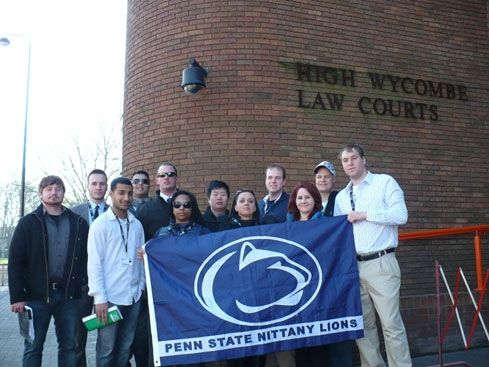Penn State Abington students will have the opportunity to incorporate the benefits of international education into their coursework this spring through four courses with short-term travel components. The curriculum will require students to travel to Nicaragua for an examination of the Sandinista Revolution, to Italy for robotics and to England for criminal justice and religious studies.
The Sandinista Revolution (SOC 479) will explore the Sandinista Revolution in Nicaragua from 1979 to the present to establish its place in social history. Students will probe the cultural dimensions of the revolution through songs, poetry and religious inspiration, and study two of its revolutionary icons: Augusto Sandino and Carlos Fonseca. The course culminates with a trip to Nicaragua, where the class will join students and faculty from the Universidad Catolica de Nicaragua for seminars, service and day travel. The course will be taught by Karen Halnon, associate professor of sociology at Abington, whose current research focuses on Latin America, where she has traveled and studied extensively.
The Robotics in Italy course is designed to give a group of Abington engineering and information sciences and technology (IST) majors the chance to explore robotics technology and culture in an international setting. After traveling to Rome in association with Roma Tre University, they will work with international faculty and students and visit robotics laboratories as well as international companies and organizations. The students also will explore cultural sites related to robotics and engineering design, such as an inventions exhibit featuring the work of Italian genius Leonardo da Vinci. This one-credit course is designed to supplement and enhance other robotics coursework that students will take concurrently.
The final two Abington courses will send students to England. Criminal Justice in England (CRIMJ 499) focuses on a body of scholarship addressing the critical issues, policies and complexities of the criminal justice systems in the United States and United Kingdom. A wide range of topics will be explored including the analysis of specific social and justice system challenges, the global impact of criminality and the challenges of transnational crime.
Meanwhile, a second Abington group enrolled in Religious Uses of Neolithic Stone Circles in Southwest England (RL ST 297A) will study prehistoric monuments in the context of their landscape and their religious significance while focusing on two of the most spectacular complexes of monuments in the ancient world: Stonehenge and Avebury.
For more information, go to www.abington.psu.edu/international-courses.

